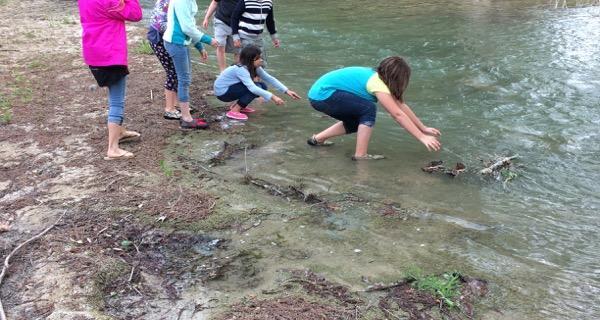One thing I have promised to do this summer is to spend more time outdoors with my beautiful granddaughters. I have been blessed to witness their joy—an unbridled sense of awestruck wonder—many times this past year: I saw it the first time Lucy held a rose petal to her nose; I glimpsed it in Georgia’s smile as she discovered and picked tiny flowers hidden in the grass of my back yard; I also saw it when they laughed and chased a butterfly fluttering through my garden; I could even sense their joy as they cheerfully gathered and presented me with several unremarkable pebbles from my front sidewalk.
As adults, we often forget how wonderful our world can be. For children, wonder awaits around every corner, if we allow them time to explore. Our dictionary has a rather simple definition of wonder. For me, the word has a very spiritual definition: Wonder is our capacity to recognize, appreciate and enjoy the many gifts of God – the beauty and marvels of His creation, and the mystery of the kingdom of God, both within us and all around us.
Aline Wolf in Nurturing the Spirit of the Child describes the gift of wonder this way:
“[Wonder is] like a delicate seedling that one hopes will never be trampled on and never allowed to dry up. With careful nourishment childhood wonder will flower into a deep reverence for nature that can keep one’s spirit alive into a vital old age.”
Young children are rich in the gift of wonder, but wonder must be cultivated for it to survive, to grow and flourish. Regularly providing children time outdoors—feeding ducks or otherwise exploring the natural world, is a great way to cultivate an nurture your child’s gift of wonder. Examining the shapes and colors of flower petals, exploring the texture of a stone or shell, or simply examining a garden spider in its web can create an intense state of concentration and wonder within your child.
Young children can teach us to look again at the world around us in wonder. Like Montessori, if we observe our children, we can learn from what they do. Like natural contemplatives, children truly become one with what they see, touch, hear, taste and smell. It seems that even the simplest of objects, “fragments of nature” so to speak, can awaken the sense of wonder in a child.
I encourage all parents to watch their children splashing in puddles, collecting sticks and rocks, or rolling down hills. If you put children in a natural setting, you will see that they can find endless ways to explore and find “wonder” in the world. With luck, you will join them in their explorations and rediscover your own “gift of wonder.”
I’ll admit, exposing children to nature is becoming more and more difficult in modern urban areas. Buildings and roads are fast replacing forest and field. Many urban creeks and streams are now too cluttered with litter and debris to explore and algae-covered local ponds sometimes harbor only mosquitoes and disease-causing microbes and bacteria.
Montessori expressed similar concerns 70 years ago:
“In the civilized environment of our society, children live far from nature and have few opportunities of entering into intimate contact with it. Does anyone let them run out when it is raining, take of their shoes when they find pools of water, and let them run about bare feet when the grass of the meadow is wet with dew?”—Maria Montessori,
from Education in the World
A child’s need to observe the intricate workings of nature is now as acute as it was when Montessori first observed children. In our high-paced, modern technological environment, there seem to be fewer and fewer places where over-scheduled children are allowed the time, space and freedom to experience the simple wonders found in the natural world around us.
Thankfully here in San Antonio, we are blessed with many, many places to explore nature. Our many parks and greenway trails are easily accessible for family outings and hikes. The San Antonio Botanical Gardens, the local Audubon Society and the San Antonio River Authority host guided tours, sponsor birding events, and offer waterway exploration “paddle trails.”
Perhaps now, more than ever, we parents and teachers need to give children the opportunity to observe reality, to give their minds time to settle and meditate on fragments of nature, to allow them moments to stop, look and wonder.
After all, the gift of wonder helps us all find and enjoy God every day and everywhere. Where will you discover Him this summer?

